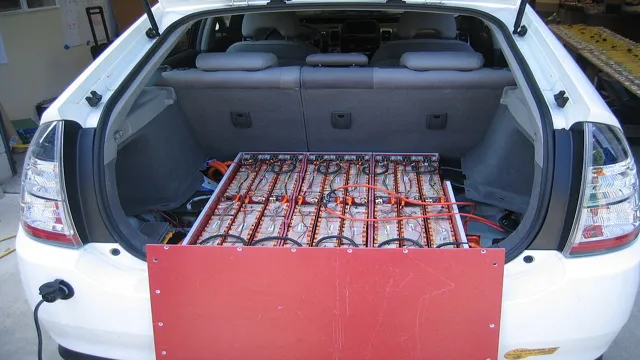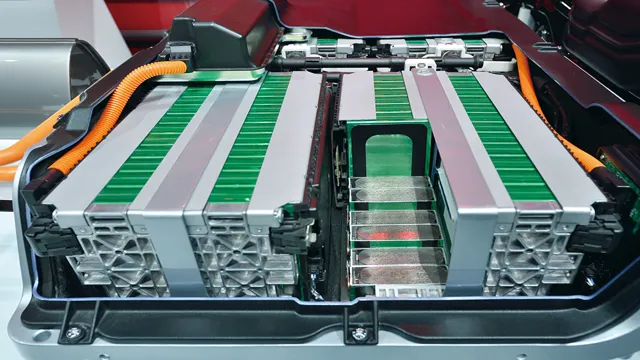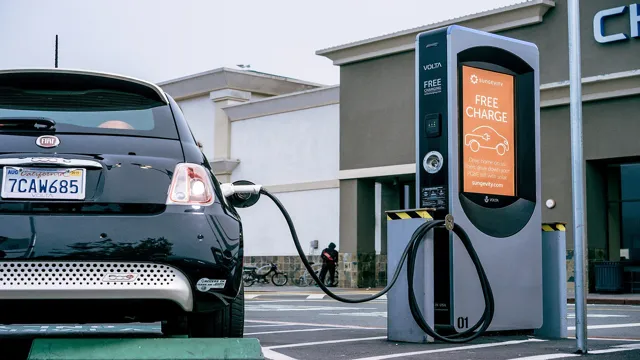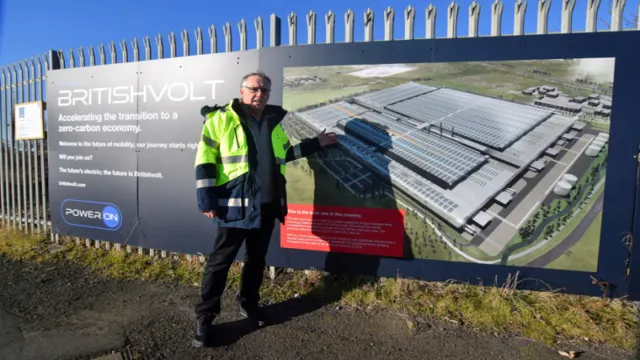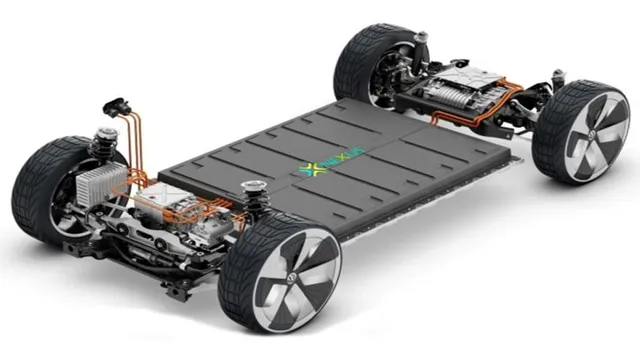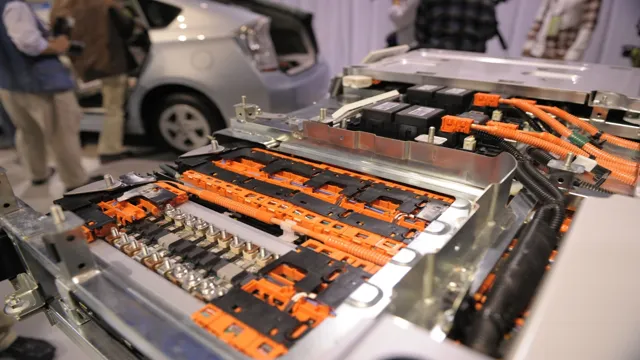Bigger is Not Always Better: Exploring the Ideal Battery Size for Electric Cars!
Electric cars are becoming increasingly popular, especially with the push for eco-friendly technology. While many people understand the basics of electric cars, not everyone understands how battery size affects their performance. The battery is the heart of the electric car, providing the power to move it down the road.
And just like our own hearts, the size of the battery can significantly impact the car’s performance. But how does it affect the performance? Does a larger battery mean better performance? Or can a smaller battery be just as effective? This blog will explore the relationship between battery size and electric car performance, helping you understand what to consider when choosing an electric vehicle. So, let’s dive in and explore the relationship between battery size and electric car performance.
Impact of Battery Size on Range
When it comes to electric cars, the size of the battery plays a crucial role in determining the vehicle’s range. A larger battery means more energy storage capacity, which translates into a longer distance that the car can travel on a single charge. On the other hand, a smaller battery may limit the range of an electric vehicle, making it less practical for longer trips.
For example, a car with a small battery may only be able to travel 100 miles on a single charge, while another with a larger battery can go up to 300 miles or more. Of course, the actual range also depends on other factors such as driving style, weather conditions and terrain. But generally speaking, a bigger battery provides more flexibility and convenience for electric car owners.
As battery technology continues to improve, we can expect to see even larger capacity batteries that can power electric vehicles for much longer distances.
Data comparison of electric cars’ ranges based on their battery capacity
When it comes to range in electric cars, battery size matters. The larger the battery, the farther the car can go before needing a recharge. This is because the battery capacity determines how much energy the car can store to power its electric motor.
For example, the Tesla Model S with a 100-kWh battery pack has a range of up to 373 miles, while the Nissan Leaf with a 40-kWh battery pack has a range of up to 150 miles. However, it’s important to note that range can also be influenced by other factors such as driving behavior, weather conditions, and terrain. So, while a bigger battery does generally lead to a longer range, other variables come into play as well.
That being said, it’s clear that battery size plays a significant role in determining how far an electric car can go on a single charge.
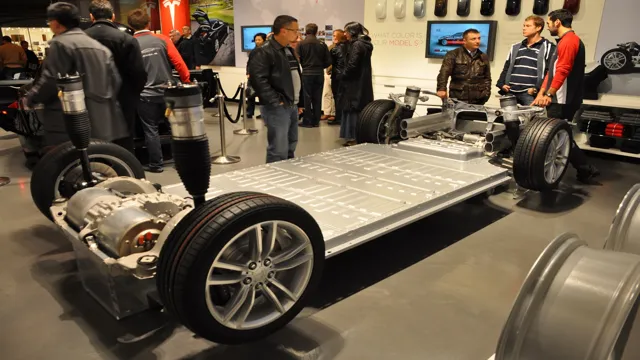
Examples of long-range electric cars and their battery configurations
When it comes to long-range electric cars, battery size plays a significant role in determining how far a vehicle can travel on a single charge. Take the Tesla Model S, for example. Its 100 kWh battery pack allows for a range of up to 402 miles on a single charge, while the Nissan Leaf’s 40 kWh battery pack offers a range of just 150 miles.
However, it’s important to note that battery size isn’t the only factor in determining range. The efficiency of the car’s motor, aerodynamics, and weight all play a role as well. In general, larger batteries do allow for longer ranges, but they also come with a higher price tag.
Finding the right balance between range and cost is the key to success in the electric car industry.
Charging Time and Battery Size
One of the biggest concerns among electric car owners is the size of the battery and how long it takes to charge. The size of the battery will vary by make and model, and will determine the range the vehicle can travel on a single charge. Generally, the larger the battery, the further the car can go before needing to be recharged.
However, a larger battery will also take longer to charge, especially if using a standard 120-volt outlet. It’s important to consider the size of the battery when purchasing an electric car, as well as the type of charging infrastructure in your area, to ensure you are able to charge your vehicle efficiently. While it may take longer to charge a larger battery, it’s important to remember that the increased range may offset the longer charging times, making it worth it in the long run.
How battery size affects charging time and the availability of charging stations
When it comes to electric vehicles, battery size plays a crucial role in charging time and the availability of charging stations. The larger the battery, the longer it takes to charge fully. For example, a smaller battery may take only 40 minutes to charge at a fast-charging station, while a larger battery may take up to two hours.
However, larger batteries typically have a longer range, meaning you can travel further without needing to stop and recharge as often. This also means that there may be fewer charging stations available for larger batteries, as they are not as common as smaller batteries. It’s important to consider your daily driving habits and travel needs when choosing a battery size for your electric vehicle.
Data comparison of charging times based on battery capacity and charging stations
When it comes to electric vehicles, one of the biggest concerns for drivers is the amount of time it takes to charge the battery. Many people assume that the larger the battery size, the longer it will take to charge. However, this is not always the case.
In fact, charging times can vary greatly depending on both the battery capacity and the type of charging station used. For example, a smaller battery might take longer to charge on a low-powered Level 1 charging station, while a larger battery may charge more quickly on a high-powered Level 3 DC fast charging station. It’s important for EV drivers to understand this relationship between battery size and charging time, and to plan their trips accordingly based on the charging capabilities of their vehicle and the charging stations available on their route.
Examples of electric cars with short and long charging times based on battery size
When considering electric cars, it is important to think about both the battery size and the charging time. Cars with larger battery sizes generally have longer ranges and can travel farther on a single charge. However, larger batteries also take longer to charge.
For example, the Tesla Model S has a battery size of around 100 kWh, which gives it a range of over 400 miles. However, it can take over 10 hours to charge fully with a standard charger. On the other hand, the Nissan Leaf has a battery size of around 40 kWh, which allows it to travel around 150 miles on a single charge.
It can be fully charged in around 7 hours with a standard charger. While the Nissan Leaf may not have the same range as the Tesla Model S, it has a shorter charging time and is more affordable, making it a great option for those who want an electric car but don’t need to travel long distances on a regular basis. Ultimately, the right choice depends on your specific needs and priorities.
Cost of Electric Cars Based on Battery Size
When it comes to electric cars, the cost can vary greatly depending on the battery size. Generally, larger battery sizes will result in a higher price tag for the car. However, this price increase can be offset by potential savings on fuel and maintenance over time.
For example, a smaller battery size may have a lower initial cost, but may also have a shorter driving range and require more frequent charging. On the other hand, a larger battery size will typically provide a longer driving range and require less frequent charging, but may have a higher upfront cost. Ultimately, the decision on battery size and associated cost will depend on individual preferences and needs, as well as the available options from car manufacturers.
Data comparison of the cost of electric cars based on battery size
Electric Cars, Battery Size, Cost Comparison When it comes to electric cars, the battery size plays a crucial role in determining the cost. Generally, the larger the battery size, the higher the cost of the car. This is because the battery is one of the most expensive components of an electric car.
For instance, a small electric car with a battery size of 30 kWh may cost around $20,000, while a larger car with a battery size of 100 kWh may cost more than $50,000. However, the cost of electric cars based on battery size is not that straightforward. Many factors can affect the price of an electric car, such as the model, brand, features, and technology used.
Additionally, the cost of batteries is constantly changing, with new developments and innovations emerging all the time. This makes it difficult to provide a definitive answer on the cost of electric cars based solely on battery size. Nevertheless, it is still useful to consider the battery size when comparing the costs of electric cars.
It can give consumers an idea of what to expect from different models and brands. Furthermore, it can help them determine whether a particular electric car is cost-effective and provides good value for money. Ultimately, the cost of an electric car depends on many different factors, and consumers should do their research and consider their individual needs before making a purchase.
Examples of affordable and expensive electric cars based on battery size
When it comes to buying an electric car, the size of the battery impacts the overall cost of the vehicle. Generally speaking, the bigger the battery, the more expensive the car. For instance, a smaller battery electric car like the Nissan Leaf with a 40 kWh battery is more affordable than a Tesla with a 100 kWh battery.
However, larger batteries can get you more range, so it’s ultimately up to the individual to decide which is a better value. As for affordable options, the Chevy Bolt and Kia Niro both have between 60-65 kWh batteries and decent ranges of around 200 miles, while luxury electric vehicles like the Tesla Model S and Audi e-tron have batteries closer to 95 kWh and can go over 300 miles per charge. It’s essential to consider the size of the battery when shopping for an electric car and weigh the cost versus the potential range and performance.
Future of Battery Size in Electric Cars
As electric cars become more mainstream, there is a growing interest in the future of battery size. Larger batteries mean longer driving range, but they also add to the weight and cost of the vehicle. With advancements in technology, it is likely that battery size will continue to increase without negatively impacting these other factors.
In fact, some experts predict that we could see electric car batteries with a range of 1,000 miles within the next decade. This would revolutionize the industry, making electric cars a more practical option for long road trips and eliminating the issue of “range anxiety” for many consumers. However, it’s important to consider the sustainability of these larger batteries and the impact they could have on the environment if not properly recycled.
Overall, the future of battery size in electric cars is exciting, but we must also be mindful of the potential consequences and work towards sustainable solutions.
Conclusion
In the world of electric cars, battery size is everything. It’s like having a giant gas tank in your traditional car, except your efficiency and longevity are even more important. With a larger battery, you can drive further and store more energy for when you need it most.
It’s all about maximizing that range and getting the most out of your electric ride. So, if you’re looking to go green and power up with an electric car, remember that the size of your battery is key to unlocking the full potential of your eco-friendly ride.”
FAQs
What is the average battery size in an electric car?
The average battery size in an electric car varies depending on the make and model, but it typically ranges from 40 kWh to 100 kWh.
How long does it take to charge the battery of an electric car?
The charging time for an electric car battery depends on the charger used. A Level 1 charger can take up to 12-24 hours to fully charge a battery, while a Level 2 charger can take 4-8 hours. A Level 3 fast charger (DCFC) can charge a battery up to 80% in just 30 minutes.
Can the battery of an electric car be replaced?
Yes, the battery of an electric car can be replaced, but it can be expensive. The cost of a replacement battery can range from a few thousand dollars to over ten thousand dollars, depending on the make and model of the car.
How does the battery size affect the driving range of an electric car?
The driving range of an electric car is directly proportional to its battery size. The larger the battery, the more energy it can store and the longer the driving range will be. However, other factors like driving style, terrain, and weather also affect the car’s driving range.
